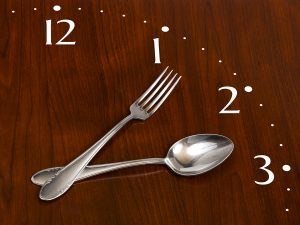How long did it take you to eat breakfast? What about dinner? If you want to cut calories without being hungry, a new review of the research suggests that eating that meal a little slower may help you do just that. 
Dietitians, and mothers everywhere, have long suggested that people should eat slower. A few observational studies have also noted that heavier people eat more quickly than those who are leaner.
But this analysis focused only on experimental studies. It adds to the evidence that eating slower may help people get to a healthy weight, without being hungry. And being at a healthy weight is one of the most important ways to reduce cancer risk, given that overweight and obesity link to increased risk of eight cancers.
For this analysis, researchers found 22 studies that each manipulated how fast people ate, then measured how much they ate. Most of the studies randomly assigned people to an eating-rate group.
Overall, those eating faster ate more than those eating slower. And up to three and a half hours after the meal, there was no difference in hunger between those eating speedy or slow.
It also didn’t seem to matter how people slowed down their eating. Studies included a variety of ways in order to get eaters to eat slower, such as chewing slower, answering questions between bites, or using an unwieldy utensil (straw versus spoon).
Not all studies agreed though, but the researchers could not identify specific factors that may have contributed to the differences, such as meal type, sex or weight.
Only about a third of the studies disguised the aims of their research to the participants, which could have swayed behavior or participants’ reports of hunger, the authors note. And these studies were short-term, making it difficult to draw conclusions on sustainability. Most of these studies also included young adults at a healthy weight. More research is needed in figuring out the best strategies to help people slow down, conclude the authors.
One of the authors was funded by the UK Medical Research Council Programme.





